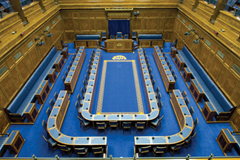Assembly private secretaries
 agendaNi explores Stormont’s new position, which promotes backbenchers and shares the Minister’s workload.
agendaNi explores Stormont’s new position, which promotes backbenchers and shares the Minister’s workload.
The phrase Assembly Private Secretary (APS) is the latest addition to Stormont’s lexicon and the newest new level of government on the hill. APSs are backbench MLAs who assist their party’s ministers and are briefed in the main issues inside the department’s remit. As each APS is unpaid, the post is cheaper than appointing junior ministers to each portfolio.
Special advisors will continue to work inside departments.
This was a DUP proposal and party leaders agreed to the move after allocating the departments. The DUP and Sinn Féin have both named their nominees and officials are drawing up the procedures to formally appoint them. A code of conduct will also be produced.
Simon Hamilton will be the most closely watched APS, as his job is meant to ensure a “seamless handover” when he becomes Finance Minister sometime in 2013.
During the last Assembly, parties kept a spokesman for each of their portfolios, to back the Minister up. John O’Dowd, significantly, was Sinn Féin’s education spokesman and regularly defended Caitríona Ruane as Education Minister.
In both the DUP and Sinn Féin, APSs are appointed by the party leader in consultation with the Minister. A separate party spokesman could still put forward its views on the relevant Assembly committee. The APS could also sit on the committee. Essentially, the party sees the APS as “helping the Minister with their day-to-day duties”.
Asked about the party’s manifesto commitment to cut the size of government, a party spokesman saw no contradiction. APSs, he explained, would not receive a salary for that work or any administrative support inside the department. They would use their Parliament Buildings office instead.
Sinn Féin describes its APSs as ‘parliamentary under secretaries’, a term for junior ministers in the British Government. When this was put to Sinn Féin, a spokesman said it was a parliamentary term and the party did not get “hung up” on titles. Parliamentary under secretaries may also be party spokesman given the “symbiotic nature of the brief”.
Alliance has decided not to appoint APSs as it thinks the status quo works well.
The concept of the APS follows Westminster’s example, where a parliamentary private secretary (PPS) assists a minister from the backbenches. PPSs are also unpaid but the job is seen as the first step towards a ministerial post.
Like the whip, a PPS watches other backbenchers and reports back to the Minister about how his or her performance is viewed. The PPS is expected to resign their post if they object to government policy. A PPS cannot join a select committee or table an amendment to a government Bill.
The old Northern Ireland Parliament had ‘parliamentary secretaries’ but these were junior ministers rather than backbenchers.
|
APS appointments |
||
|
Department |
Name |
Party |
|
OFMDFM |
Paul Girvan |
DUP |
|
OFMDFM |
under consideration |
SF |
|
DARD |
Pat Doherty |
SF |
|
DCAL |
Barry McElduff |
SF |
|
DE |
Mitchel McLaughlin |
SF |
|
DEL |
none |
Alliance |
|
DETI |
Alastair Ross |
DUP |
|
DoE |
to be announced |
SDLP |
|
DFP |
Simon Hamilton |
DUP |
|
DHSSPS |
Alex Easton |
DUP |
|
DoJ |
none |
Alliance |
|
DRD |
Danny Kinahan |
UUP |
|
DSD |
William Humphrey |
DUP |





